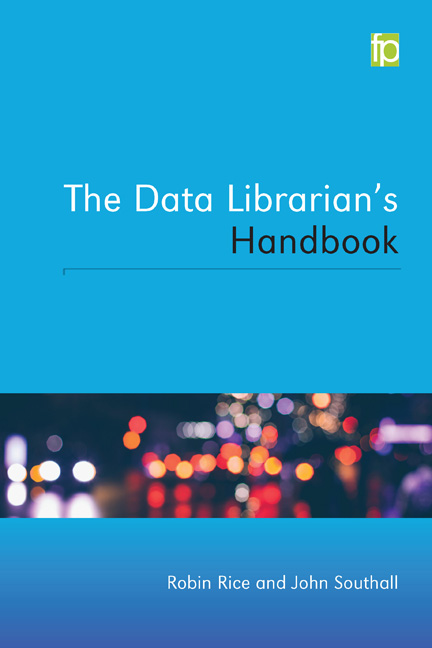Book contents
- Frontmatter
- Contents
- Acknowledgements
- Preface
- 1 Data librarianship: responding to research innovation
- 2 What is different about data?
- 3 Supporting data literacy
- 4 Building a data collection
- 5 Research data management service and policy: working across your institution
- 6 Data management plans as a calling card
- 7 Essentials of data repositories
- 8 Dealing with sensitive data
- 9 Data sharing in the disciplines
- 10 Supporting open scholarship and open science
- References
- Index
6 - Data management plans as a calling card
Published online by Cambridge University Press: 08 June 2018
- Frontmatter
- Contents
- Acknowledgements
- Preface
- 1 Data librarianship: responding to research innovation
- 2 What is different about data?
- 3 Supporting data literacy
- 4 Building a data collection
- 5 Research data management service and policy: working across your institution
- 6 Data management plans as a calling card
- 7 Essentials of data repositories
- 8 Dealing with sensitive data
- 9 Data sharing in the disciplines
- 10 Supporting open scholarship and open science
- References
- Index
Summary
Responding to challenges in data support
Academic librarians play an important role in supporting the research process throughout its many phases. In order to maintain this level of support they also need to be responsive to new requirements being placed on researchers. So while there are expectations from institutions and funders that more thought be given to the general principles of data management, there are also specific stages in the data lifecycle where new and potentially unfamiliar activities may be identified and supported. The production of a DMP is a perfect example of such an activity. It is an important stage in the management of research data where, ‘Principal investigators (PIs) … document their plans for describing, storing, securing, sharing, and preserving their research data’ (Bishoff and Johnston, 2015, 1), but also presents an opportunity for academic librarians to give guidance and introduce themselves to their target audience. Preparation of a DMP benefits from various stages of redrafting much like a consent agreement (a document discussed within this chapter and in more detail in Chapter 8). It is an opportunity for the data librarian to offer support and advice for what is becoming a key document – but also one that may be unfamiliar even to experienced researchers – which will have a great deal of impact.
Leading by example: eight vignettes
In this chapter we have selected case studies – or vignettes – from a range of disciplines to show how the demands of RDM are being dealt with at different institutions and how advice on data management planning is being used to establish links and recognition. Each is written by a different data librarian, research data manager or data professional, and illustrates how the needs of researchers are addressed through a mixture of awareness raising about RDM and troubleshooting specific details of project administration.
Social science research at the London School of Economics and Political Science
Laurence Horton, Data Librarian, Digital Library, London School of Economics
Before the LSE Library set up an RDM support service in 2014, data management planning support consisted of the research office providing award applicants with a plan from someone's previously successful application and letting them copy and adapt it.
- Type
- Chapter
- Information
- The Data Librarian's Handbook , pp. 87 - 102Publisher: FacetPrint publication year: 2016



